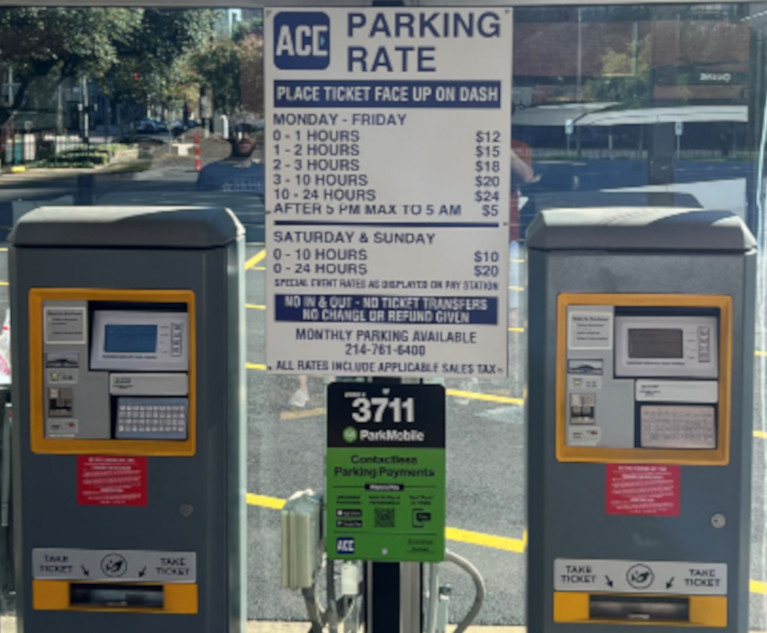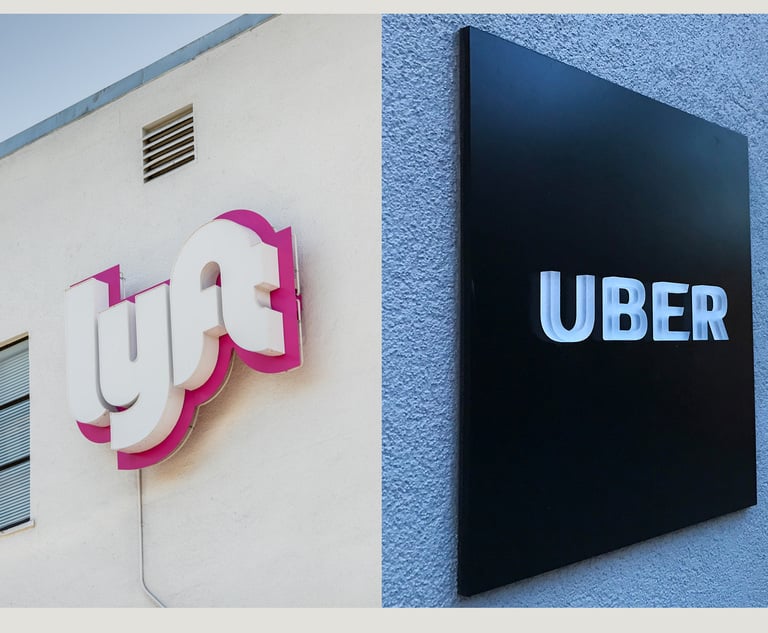'The Handwriting Is on the Wall': San Diego Judge Sounds Alarm for Gig Companies in Instacart Ruling
San Diego Superior Judge Timothy Taylor granted the San Diego City Attorney's request for a preliminary injunction in the fight over whether to classify Instacart's "shoppers" as employees, writing that all three branches of California's government had weighed in on the state's "unapologetically pro-employee" policy.
February 25, 2020 at 06:19 PM
4 minute read
 Courtesy photo
Courtesy photo
Instacart is vowing to appeal a ruling from a state court judge in San Diego who found that California law requires the grocery delivery company to classify its "shoppers" as employees—and pay and provide them benefits accordingly.
San Diego Superior Court Judge Timothy Taylor granted San Diego's request for a preliminary injunction in a ruling dated Feb. 18, but issued to the parties Monday. The judge wrote that all three branches of California's government have weighed in on the state's "unapologetically pro-employee" policy.
"The Supreme Court announced Dynamex two years ago," wrote Taylor, citing the California Supreme Court decision adopting the so-called "ABC test" for when workers should be classified as employees eligible for overtime, expense reimbursement and other benefits. Taylor noted that the decision "gave rise to a long debate in the legal press and in the Legislature," which led to the passage of AB5 codifying the Dynamex ruling last fall and Gov. Gavin Newsom signing the bill into law. "To put it in the vernacular, the handwriting is on the wall," wrote Taylor of the level of fore-warning for companies in Instacart's position.
An Instacart spokesperson said that the company disagrees with the decision. "We're in compliance with the law and will continue to defend ourselves in this litigation. We are appealing this decision in an effort to protect shoppers, customers and retail partners," the spokesperson said. "The court has temporarily stayed the enforcement of the injunction, and we will be taking steps to keep that stay in place during the appeals process so that Instacart's service will not be disrupted in San Diego," the spokesperson added.
San Diego City Attorney Mara W. Elliott, in a statement, called the ruling "a warning to other companies to do right by their employees."
"As the court said, 'The handwriting is on the wall,'" she said. "California has had two years since the Supreme Court's Dynamex decision to distinguish between a contractor and an employee. Everyone, not just Instacart, must live up to their legal responsibilities; they cannot ignore the significance of what occurred here."
Taylor's ruling comes as companies have mixed success in challenging AB5 in court, with a state court judge in Los Angeles finding that AB5 was preempted by federal law when applied to motor carriers and their drivers and Uber and Postmates losing out on a bid to block enforcement of the law. The newly granted injunction was seen by lawyers on either side of the employment bar as a blow to gig economy companies.
Richard Meneghello of Fisher Phillips in Portland said that this was the latest example of seeing the ABC test in action and a demonstration of how potentially devastating it could be to the gig model.
"The big-picture takeaway here is that I think many cities might view this action as a blueprint for how they might go after other companies," Meneghello said. Meneghello said that he hopes that the judge's move to stay enforcement might allow potential legislative changes to AB5 or a potential ballot initiative being pondered by gig companies to move forward before large-scale reclassification of gig workers. "I think most people involved in this recognize this is such a fluid issue right now and that many people feel like AB5 got ahead of itself," Meneghello said.
But Shannon Liss-Riordan of Lichten & Liss-Riordan, who is handling multiple suits with claims under Dynamex and AB5 against gig companies, said that the ruling sends a message on an issue that, by now, should be clear.
She said AB5 "simply codified a court ruling that's two years old" and that companies have been "thumbing their noses" at the Dynamex decision.
"The legislature has spoken, the governor has spoken, and the court has spoken," she says. "They're just delaying right now in hopes that the landscape will change."
This content has been archived. It is available through our partners, LexisNexis® and Bloomberg Law.
To view this content, please continue to their sites.
Not a Lexis Subscriber?
Subscribe Now
Not a Bloomberg Law Subscriber?
Subscribe Now
NOT FOR REPRINT
© 2025 ALM Global, LLC, All Rights Reserved. Request academic re-use from www.copyright.com. All other uses, submit a request to [email protected]. For more information visit Asset & Logo Licensing.
You Might Like
View All
Willkie Farr & Gallagher Drives Legal Challenge for Uber Against State's Rideshare Laws
5 minute read

Uber Not Responsible for Turning Over Information on 'Dangerous Riders' to Competitor, Judge Finds
5 minute read
'A Fierce Battle of Expert Witnesses' Expected in Cybersecurity Spat
Law Firms Mentioned
Trending Stories
- 1Reviewing Judge Merchan's Unconditional Discharge
- 2With New Civil Jury Selection Rule, Litigants Should Carefully Weigh Waiver Risks
- 3Young Lawyers Become Old(er) Lawyers
- 4Caught In the In Between: A Legal Roadmap for the Sandwich Generation
- 5Top 10 Developments, Lessons, and Reminders of 2024
Who Got The Work
J. Brugh Lower of Gibbons has entered an appearance for industrial equipment supplier Devco Corporation in a pending trademark infringement lawsuit. The suit, accusing the defendant of selling knock-off Graco products, was filed Dec. 18 in New Jersey District Court by Rivkin Radler on behalf of Graco Inc. and Graco Minnesota. The case, assigned to U.S. District Judge Zahid N. Quraishi, is 3:24-cv-11294, Graco Inc. et al v. Devco Corporation.
Who Got The Work
Rebecca Maller-Stein and Kent A. Yalowitz of Arnold & Porter Kaye Scholer have entered their appearances for Hanaco Venture Capital and its executives, Lior Prosor and David Frankel, in a pending securities lawsuit. The action, filed on Dec. 24 in New York Southern District Court by Zell, Aron & Co. on behalf of Goldeneye Advisors, accuses the defendants of negligently and fraudulently managing the plaintiff's $1 million investment. The case, assigned to U.S. District Judge Vernon S. Broderick, is 1:24-cv-09918, Goldeneye Advisors, LLC v. Hanaco Venture Capital, Ltd. et al.
Who Got The Work
Attorneys from A&O Shearman has stepped in as defense counsel for Toronto-Dominion Bank and other defendants in a pending securities class action. The suit, filed Dec. 11 in New York Southern District Court by Bleichmar Fonti & Auld, accuses the defendants of concealing the bank's 'pervasive' deficiencies in regards to its compliance with the Bank Secrecy Act and the quality of its anti-money laundering controls. The case, assigned to U.S. District Judge Arun Subramanian, is 1:24-cv-09445, Gonzalez v. The Toronto-Dominion Bank et al.
Who Got The Work
Crown Castle International, a Pennsylvania company providing shared communications infrastructure, has turned to Luke D. Wolf of Gordon Rees Scully Mansukhani to fend off a pending breach-of-contract lawsuit. The court action, filed Nov. 25 in Michigan Eastern District Court by Hooper Hathaway PC on behalf of The Town Residences LLC, accuses Crown Castle of failing to transfer approximately $30,000 in utility payments from T-Mobile in breach of a roof-top lease and assignment agreement. The case, assigned to U.S. District Judge Susan K. Declercq, is 2:24-cv-13131, The Town Residences LLC v. T-Mobile US, Inc. et al.
Who Got The Work
Wilfred P. Coronato and Daniel M. Schwartz of McCarter & English have stepped in as defense counsel to Electrolux Home Products Inc. in a pending product liability lawsuit. The court action, filed Nov. 26 in New York Eastern District Court by Poulos Lopiccolo PC and Nagel Rice LLP on behalf of David Stern, alleges that the defendant's refrigerators’ drawers and shelving repeatedly break and fall apart within months after purchase. The case, assigned to U.S. District Judge Joan M. Azrack, is 2:24-cv-08204, Stern v. Electrolux Home Products, Inc.
Featured Firms
Law Offices of Gary Martin Hays & Associates, P.C.
(470) 294-1674
Law Offices of Mark E. Salomone
(857) 444-6468
Smith & Hassler
(713) 739-1250






